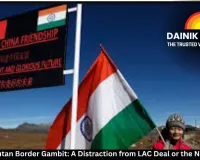GPS Spoofing Crisis at Delhi Airport: Time for India to Ditch US Reliance and Embrace NavIC
Digital Desk

In a chilling echo of cyber warfare tactics straight out of a thriller novel, Delhi's Indira Gandhi International Airport (IGI)—the world's ninth-busiest hub—has been grappling with severe GPS spoofing for seven straight days. Pilots, cleared for landing, suddenly find their instruments screaming they're hovering over Haryana, not the capital's skies.
Flights delayed, diverted to Jaipur, passengers stranded—this isn't fiction; it's a stark wake-up call to India's navigation vulnerabilities. As air traffic surges with 60-70 takeoffs and landings per hour, one false signal could spell disaster.
Is our sky-high dependence on America's GPS the real culprit? Absolutely, and it's high time we pivot to self-reliance with NavIC.
GPS spoofing, for the uninitiated, isn't your garden-variety jamming—where signals are simply blocked. This insidious manipulation floods receivers with fake satellite signals, overriding genuine ones. Weak authentic transmissions from space get amplified or replicated by hackers, tricking devices into believing they're elsewhere.
The result? Navigational chaos: wrong positions, altitudes, speeds, and timings. Precision Navigation and Timing (PNT) services, the backbone of aviation, shipping, and even stock markets, crumble. Imagine a pilot's confusion mid-descent or a high-frequency trader's split-second decision derailed—economic ripples could crash markets overnight.
This Delhi ordeal isn't isolated. Reports from airlines confirm disruptions since early November, exacerbated by IGI's main runway closure for ILS upgrades ahead of foggy winters. Manual navigation kicked in, widening aircraft spacing to avert collisions, but delays piled up. Broader implications? Logistics grind to a halt, delivery networks falter, and financial sectors—reliant on cryptography-timed trades—face phantom crashes.
As one official quipped, it's "a weapon without firing a shot," a silent act of warfare. We've seen it in conflict zones: 465 interference incidents between November 2023 and February 2024, per global logs, from Russia-Ukraine skirmishes to whispers during India's Operation Sindoor.
Closer home, it's personal. Indian Air Force relief flights to Myanmar post-earthquake encountered spoofing claims, underscoring national security threats. Borders, from western fronts to eastern edges, aren't immune.
Why is India so exposed? Decades of leaning on foreign systems—US GPS, Russia's GLONASS, China's BeiDou—leaves us at adversaries' mercy. In an era where wars are waged via data streams, not just bullets, sovereignty over signals isn't optional; it's survival.
Enter NavIC (Navigation with Indian Constellation), India's homegrown regional satellite system launched in 2018 to supplant GPS. Covering the subcontinent and beyond, it promises indigenous PNT accuracy.
Yet, alarm bells ring: Only four of its seven satellites are operational, with recent launches faltering. This isn't just technical hiccups; it's a sovereignty shortfall. Imagine if every smartphone, drone, and aircraft defaulted to NavIC—spoofing risks plummet, economic autonomy soars.
My take? GPS reliance is a ticking time bomb. We've outgrown colonial tech crutches; self-reliance (Atmanirbhar Bharat) demands ditching them now. Accelerate NavIC repairs, mandate adoption in critical infrastructure, and invest in anti-spoofing tech.
Civil aviation authorities must brief pilots rigorously, while policymakers fast-track satellite replenishments. For UPSC aspirants eyeing geopolitics, this is gold: Study IQ's Bhuvan Jha nails it—next crises hinge on data dominance.
India's skies deserve Indian stars. Until NavIC fully orbits, we're playing Russian roulette with foreign signals.

.jpg)









